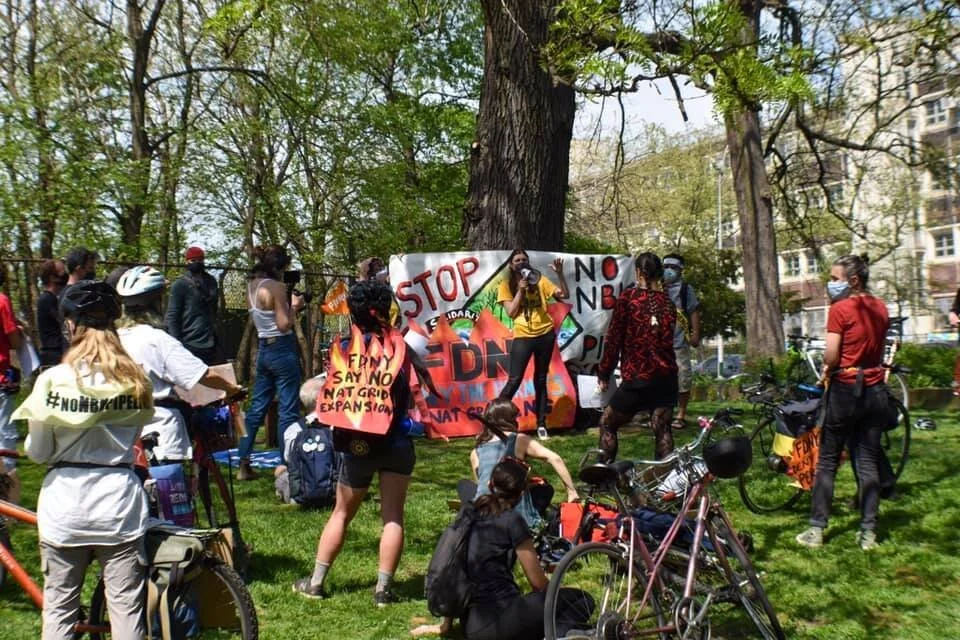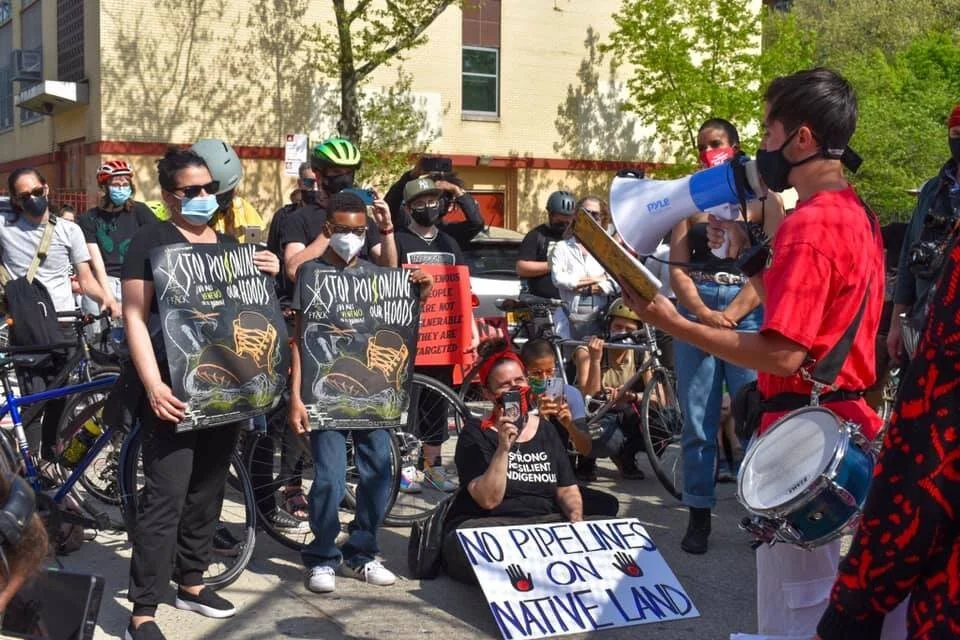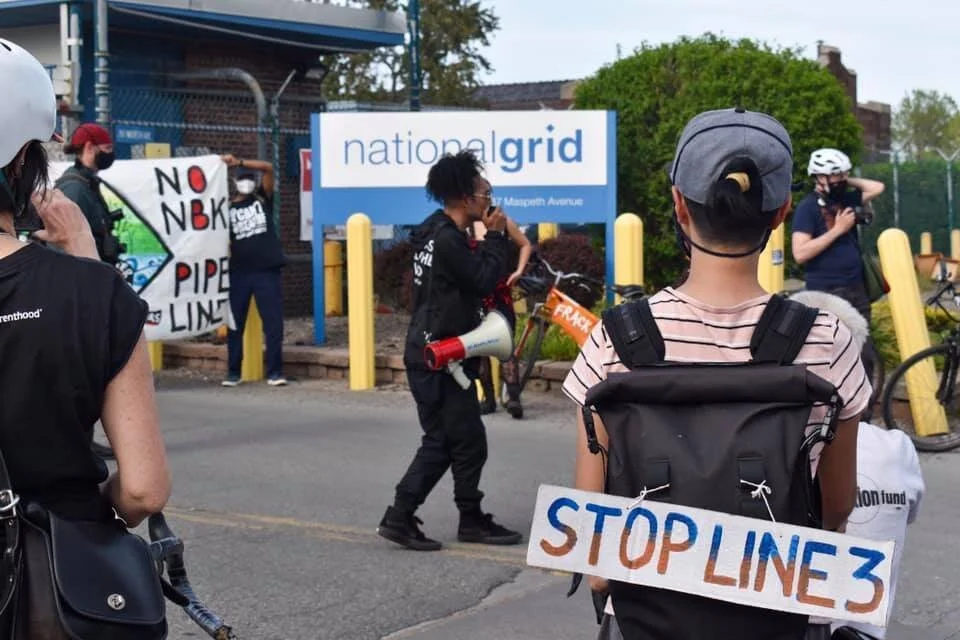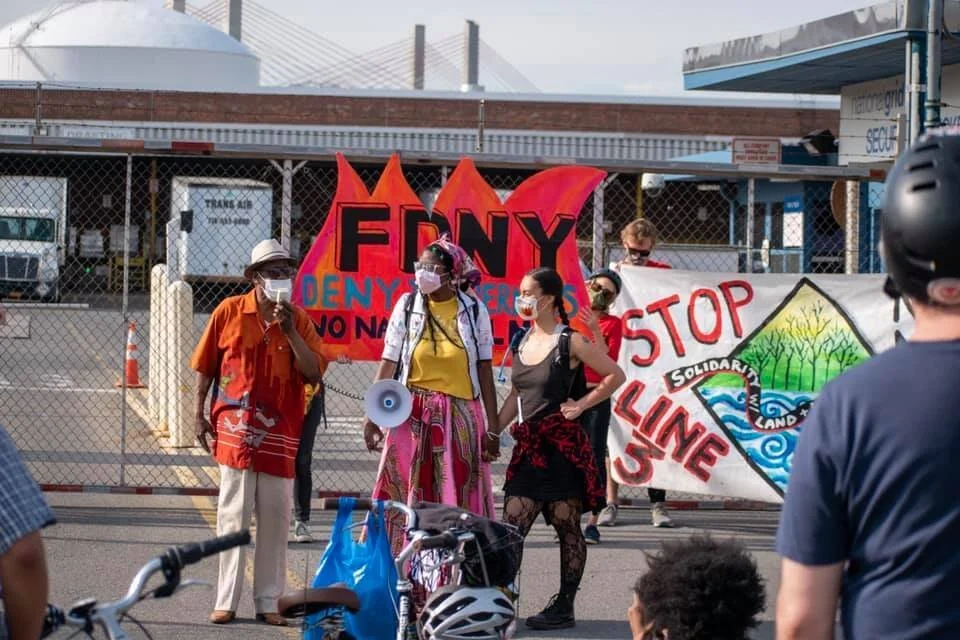Fracked Gas in North Brooklyn
Last updated 2021
Corporate utility National Grid continues to expand fossil fuel infrastructure in New York City, despite widespread opposition from the public and elected officials. National Grid’s Metropolitan Reliability Infrastructure Project, also known as the North Brooklyn Pipeline, would transport fracked gas under seven miles of predominantly Black and brown communities, beginning in the neighborhood of Brownsville and ending at the Company’s Liquefied Natural Gas (LNG) facility in Greenpoint. This pipeline—the fifth and final phase of which remains to be constructed and is currently on hold—is part of a larger project by National Grid to expand fracked gas infrastructure in North Brooklyn and saddle its customers with the costs. The Company also seeks to install two new LNG vaporizers at the pipeline’s destination facility in Greenpoint—which is located in and near state-designated “Potential Environmental Justice Areas”—and transport LNG to the Greenpoint facility by truck. LNG trucking is currently banned in New York City due to the catastrophic dangers of a potential explosion of this highly volatile fossil fuel.
In November 2020, the New York State Department of Environmental Conservation (DEC) found that National Grid’s proposal to install two new LNG vaporizers at the Greenpoint facility would have no significant adverse environmental impacts and issued a “negative declaration” under the New York State Environmental Quality Review Act (SEQRA). If allowed to stand, the negative declaration would halt the environmental review process and an Environmental Impact Statement for the project would not be required.
Moreover, National Grid is illegally proceeding with construction of an LNG Truck Load/Unload Station and other LNG trucking-related construction activities at the Greenpoint facility. Environmental review under SEQRA for these construction activities has been pending with the City of New York since 2016 and is not complete. SEQRA prohibits project sponsors from commencing construction or any other physical alteration until environmental review of a project is fully complete.
The University Network has partnered closely with the Sane Energy Project, a Brooklyn-based grassroots organization working to hasten a just transition to renewable energy, to fight National Grid’s proposed fracked gas expansion in New York City. We have submitted three public comments opposing DEC’s negative declaration. Along with Pace Environmental Litigation Clinic, we are representing Sane Energy, Cooper Park Resident Council, and three individuals in an Article 78 legal challenge against DEC and National Grid in New York State Supreme Court. We are also representing Sane Energy and Cooper Park Resident Council in a hybrid Article 78 and declaratory judgment proceeding against the City of New York and National Grid to halt the Company’s illegal LNG trucking-related construction activities.
Read our public comment #1 here
Read our public comment #2 here
Read our public comment #3 here
Read our legal challenge to the LNG vaporizer project here
Read our legal challenge to LNG trucking-related constructions here
We say:
Adding LNG vaporizers at the Greenpoint facility would further harm local air quality in an area that already has one of New York City’s highest levels of fine particulate matter (PM2.5), nitrogen dioxide (NO2), nitric oxide (NO), and Black Carbon (BC).
The Greenpoint facility is located in and near DEC-designated “Potential Environmental Justice Areas” (PEJAs) and the vaporizer project would harm the health and well-being of environmental justice communities that DEC is required to protect. DEC is not complying with its own Environmental Justice and Permitting Policy, which requires enhanced public participation when a proposed project is likely to affect one or more PEJAs.
Contrary to New York state environmental law, DEC conducted a segmented review of National Grid’s vaporizer project. DEC reviewed the vaporizer project in a vacuum rather than as part of National Grid’s larger fracked gas expansion plan, which also includes the North Brooklyn Pipeline and LNG trucking. The vaporizer project, on its own, has significant adverse environmental and climate impacts. When the project is considered along with its associated components, the severity of its environmental and climate impacts becomes even more apparent.
The vaporizer project is fundamentally incompatible with New York State’s landmark climate law, the Climate Leadership and Community Protection Act (CLCPA). The CLCPA requires a 40% reduction in greenhouse gas emissions (from 1990 levels) by 2030 and an 85% reduction by 2050. National Grid cannot meet its portion of this legally mandated emissions reduction by building new gas infrastructure that will prolong and expand reliance on gas as an energy source.
Ongoing construction of the LNG Truck Load/Unload Station and other LNG trucking-related construction activities are illegal and must be halted until and unless the City of New York fully completes its environmental review of these activities as required by law. Construction of this LNG infrastructure and equipment without completion of legally mandated environmental review jeopardizes the health and safety of those who live in close proximity to the Greenpoint facility. National Grid has itself acknowledged the adverse environmental impacts of the LNG trucking-related construction activities it is currently undertaking, including soil disturbance, an increase in stormwater, and hazards of the LNG loading/unloading process.




